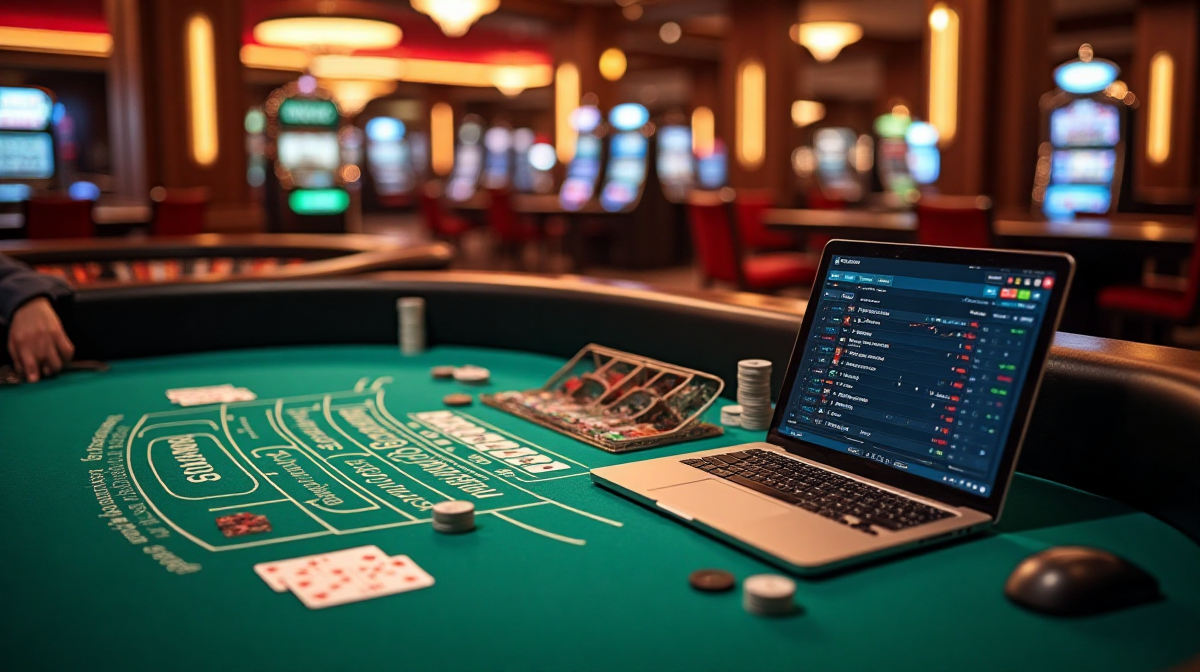Blackjack vs. Exchange Betting: Which Wins?
The Allure of Risk & Reward: Setting the Stage
Gambling, in its many forms, has always captivated humanity with the promise of quick riches and the thrill of risk. Two popular avenues for pursuing this excitement are the classic casino game of blackjack and the more modern world of exchange betting. Both offer opportunities for profit, but require different skills, strategies, and levels of risk tolerance. This article delves into a comprehensive comparison of blackjack and exchange betting, exploring their nuances to determine where your edge truly lies.
Defining Blackjack & Exchange Betting - A Quick Overview
Blackjack, a staple of casinos worldwide, is a card game where players aim to beat the dealer by getting a hand value as close to 21 as possible without exceeding it. Exchange betting, on the other hand, is a peer-to-peer betting platform where individuals bet against each other, rather than against a bookmaker. One key element to understand is how to play in exchange markets effectively.
The Core Question: Where Does Your Edge Lie?
The central question isn’t simply which game is “better,” but rather which offers a more sustainable path to profitability given your skillset and preferences. Is it the strategic depth of blackjack, or the potential for superior odds on a Betting Exchange? Let's explore.
Understanding Blackjack – The Classic Casino Game
Basic Gameplay & Rules Explained
Blackjack involves players receiving two cards and having the option to hit (take another card) or stand (keep their current hand). The goal is to have a hand total closer to 21 than the dealer’s, without going over. Face cards count as 10, Aces can be 1 or 11, and number cards are worth their face value.
House Edge & How it Works in Blackjack
Casinos inherently have a house edge in blackjack, meaning they are statistically favored to win over the long run. This edge varies depending on the rules of the game, but is typically around 0.5% to 1%. The house edge comes from players losing when they bust (go over 21) and from the dealer having the advantage of acting last.
Strategies to Improve Your Odds: Basic Strategy & Beyond
While luck plays a role, blackjack is a game of skill. Basic strategy is a mathematically derived set of decisions that minimizes the house edge. Mastering basic strategy is crucial for any serious blackjack player. Beyond basic strategy, card counting offers a potential, though increasingly difficult, advantage.
Card Counting: Myth vs. Reality & Current Feasibility
Card counting involves tracking the ratio of high to low cards remaining in the deck, allowing players to adjust their bets accordingly. While not illegal, casinos frown upon it and will often take measures to prevent it. The feasibility of card counting has significantly decreased due to the prevalence of multiple-deck shoes and sophisticated surveillance technology.
Blackjack Variations: Impact on House Edge & Strategy
Various blackjack variations exist, each with its own unique rules and house edge. Spanish 21, for example, removes the 10s from the deck, altering the optimal strategy. Double Exposure, where the dealer’s cards are face up, also significantly changes the gameplay and house edge.
Diving into Exchange Betting – A Peer-to-Peer World
What is an Exchange Betting Exchange?
A Betting Exchange is a platform that facilitates betting between users. Unlike traditional bookmakers, the exchange doesn't set the odds; instead, users offer odds (known as laying bets) and accept bets from others (backing bets). Prominent examples include Betfair and Smarkets.
How Exchange Betting Works: Backing & Laying Explained
Backing a bet is the traditional way of betting – you're wagering on an outcome to occur. Laying a bet is essentially acting as a bookmaker; you're offering odds and wagering against an outcome occurring. Understanding both concepts is fundamental to successful exchange betting.
Commission Structure & its Impact on Profitability
Exchange betting platforms charge a commission on winning bets. This commission, typically around 5%, directly impacts your profitability. Careful consideration of commission rates is vital when selecting an exchange and developing your betting strategy.
Advantages of Exchange Betting: Better Odds, No House Edge
The primary advantage of exchange betting is the potential for significantly better odds compared to traditional bookmakers. Because you're betting against other users, the odds are determined by supply and demand, resulting in a more competitive market. Critically, there's no built-in house edge, though commission effectively functions as one.
Markets Available on Exchange: Beyond Sports
While often associated with sports betting, exchanges offer a wide range of markets, including political events, financial markets, and even novelty bets like the crazy time result. This diversity expands the opportunities for finding profitable wagers.

Blackjack vs. Exchange Betting: A Head-to-Head Comparison – Profit Potential
Skill vs. Luck: Which Game Favors Expertise?
Blackjack inherently requires a greater degree of skill and strategic thinking. While luck is involved in the short term, a skilled player utilizing optimal strategy can consistently reduce the house edge. Exchange betting also benefits from skill, but is more heavily influenced by market analysis and identifying mispriced odds.
Long-Term Expected Value in Blackjack
With perfect basic strategy, the expected value in blackjack can be brought very close to zero. However, achieving this requires flawless execution and favorable game rules. Card counting, if viable, can push the EV into positive territory.
Finding Value on Exchange Betting: Identifying Mispriced Odds
The key to profitability on an exchange is identifying value – odds that are higher than your assessment of the true probability of an event occurring. This requires in-depth research, statistical analysis, and a keen understanding of the market. Many look for opportunities to bet against popular outcomes, especially regarding crazy time results.
The Role of Variance: Swing in Both Blackjack & Exchange Betting
Variance, or swing, is an inherent part of both games. In blackjack, you can experience losing streaks even while playing optimally. On an exchange, your carefully analyzed bets can still result in losses due to unforeseen events.
Bankroll Management: Crucial for Success in Both Disciplines
Effective bankroll management is paramount in both blackjack and exchange betting. Proper bankroll allocation protects you from ruin during losing streaks and allows you to capitalize on winning streaks.
Risk Assessment: Blackjack vs. Exchange Betting
The Risk of Busting: Blackjack’s Immediate Loss Potential
Blackjack carries the immediate risk of busting – exceeding 21 and automatically losing your bet. This risk can be mitigated through strategic play, but it’s always present.
Exchange Betting: Risk of Losing Liability & Timing
Exchange betting presents the risk of liability – the amount you stand to lose if your laid bet wins. Poor timing and inaccurate market assessment can lead to significant losses.
Psychological Factors: Tilt and Emotional Control in Both Scenarios
“Tilt,” the tendency to make irrational decisions after a loss, is a common enemy in both blackjack and exchange betting. Maintaining emotional control and adhering to your strategy is essential.
Avoiding Common Pitfalls: Mistakes to Avoid in Blackjack and Exchange Betting
Common blackjack pitfalls include deviating from basic strategy and chasing losses. Exchange betting mistakes include over-laying, neglecting commission, and betting on events you don’t understand.
Legal and Regulatory Considerations: Differences by Location
The legality of both blackjack and exchange betting varies by jurisdiction. It’s crucial to be aware of the laws in your location.
Tools & Resources for Players
Blackjack Strategy Trainers & Card Counting Apps
Numerous online tools and apps can help you learn and practice basic strategy. Card counting apps can aid in training, but remember their practical application is limited.
Exchange Betting Software & Automated Trading Tools
Exchange betting software can automate tasks like placing bets and monitoring odds. Automated trading tools can execute strategies based on predefined parameters.
Online Communities & Forums: Learning From Experienced Players
Online forums and communities provide a valuable platform for learning from experienced players and sharing strategies.
Resources for Odds Comparison & Statistical Analysis
Websites and tools are available for comparing odds across different exchanges and performing statistical analysis of betting markets.

Conclusion: Which is the Better Choice?
Summary of Strengths & Weaknesses: Blackjack Recap
Blackjack strengths: strategic depth, potential for skill-based advantage, relatively low house edge with optimal play. Weaknesses: house edge, declining feasibility of card counting, risk of busting.
Summary of Strengths & Weaknesses: Exchange Betting Recap
Exchange betting strengths: better odds, no direct house edge, diverse markets. Weaknesses: commission, requires market analysis skills, risk of liability.
Who is Each Option Best Suited For?
Blackjack is suitable for players who enjoy strategic thinking and are willing to learn and master complex rules. Exchange betting is ideal for those with strong analytical skills and a desire to find value in the market. The opportunity to play in exchange is attractive for those who like to be in control of their odds.
The Evolving Landscape: Future Trends in Both Worlds
Both blackjack and exchange betting are constantly evolving. Technological advancements, such as AI-powered betting tools and virtual reality casinos, are shaping the future of these games.
Final Thoughts: A Personalized Approach to Maximizing Your Chances
Ultimately, the better choice depends on your individual preferences, skills, and risk tolerance. Both blackjack and exchange betting offer opportunities for profit, but require dedication, discipline, and a personalized approach to maximizing your chances of success. Remember to gamble responsibly and understand the risks involved.

